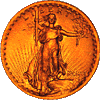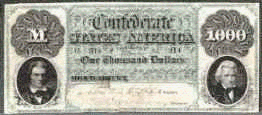

 Collectors
Corner
Collectors
Corner

Commemorative coins are issued in honor of a person or event and are sold above face value, usually to pay for the monument honoring the subject. Some of the most beautiful coins produced anywhere in the world are our own commemoratives.. Commemoratives were issued in such numbers and varieties and for so many reasons Commemorative coins are, of course, legal tender; in fact, many unsold issues were placed in circulation. Let me tell you about some of the more popular ones.
Isabella Quarter
The face of the Isabella quarter shows Queen Isabella
of Spain. It is the only American coin to feature a foreign monarch, and the only
commemorative in this denomination. Produced in 1893 at the request of the Board
of Lady Managers of the Columbian Exposition, it sold for $1.00. Slightly over 24,000
were minted.
Lafayette Dollar
The two-headed obverse of the Lafayette dollar depicts
Washington and Lafayette. It is the first coin honoring an American president, and
the only silver commemorative of this denomination.
Half Dollars
The remainder of commemorative silver consists of half
dollars. The first commemorative coin produced by th United States was the Columbian
Exposition half dollar. Two well-known designers collaborated on this coin. The Barber-designed
obver·se shows the bust of Columbus. The Morgan-designed reverse shows Columbus' ship,
the Santa Maria, above two hemispheres. Over two and a half million were produced
in 1892 and 1893, and the coin was sold for $1.00.
The Alabama Centennial half
dollar shows the portraits of W. W. Bibb, first governor of Alabama, and T. E. Kilby,
governor at the time of the Centennial. He was the first living person to appear
on a U.S. coin.
Calvin Coolidge was~the first living president to appear on a
U.S. coin. He shared the obverse, with George Washington, of the Sesquicentennial
of American Independence commemorative. The low-relief dies that produced this coin
resulted in much loss of detail, giving the coin a prematurely worn appearance.
Gold Commemoratiues
Nine types of commemorative gold coins were issued,
five in one-dollar denominations. The first gold commemorative was the Louisiana
Purchase Exposition coin. Two varieties were issued. One showed the portrait of Thomas
Jefferson, who was president when the Louisiana Territory was purchased from France.
The other showed President William McKinley. Both had the same reverse.
The Panama-Pacific
Exposition quarter eagle was the first $2.50 gold piece. For the same exposition
a round and an octagonal $50 gold piece were issued. This is the only octagonal coin
issued by the Mint other than as a pattern. The Philadelphia Sesquicentennial coin
is the only other quarter-eagle ($2.50) gold piece. Slightly over 46,000 were issued
in 1926.
Proof Coins
A proof coin is made by the Mint for collectors, not for
circulation. It has a mirror-like finish and is more strongly struck than circulation
coins. Proof coins are pampered from start to finish. First, the metal from which
they are struck is washed with a cream of tartar solution. It is then rinsed in water
and then in alcohol. Even the dies from which proof coins are struck are given a
special polish. Proof coins are struck on special presses at a much slower rate than
circulation coins. The finished proof coins are not allowed to touch other coins.
The Mint packages them in special "see-through" envelopes.
Proof coins
were discontinued after 1964, and proof presses are busy producing more mundane coinage.
Proof sets could be purchased directly from the Philadelphia Mint at that time for
only, $2.10. Each set contained the current year's coinage. Proof coins can also
be purchased from dealers at higher prices. In 1965, 1966 & 1967 they put out
what was called special mint sets, still in plastic holders but all coins were minted
in Philadelphia..In 1968 Proof sets were minted again and are still to this day and
can be purchessed from the US Mint.
Mint Sets
Mint sets are assembled by the Mint from choice coins selected
at random. Thus, it is possible to receive a mint coin with a scratch on it. Mint
sets are also packaged in "see-through" envelopes.
Mint sets of the
current year cannot be ordered before January 1 of the following year, and orders
are filled until the supply is exhausted. When available, mint sets could be purchased
from the Mint for $7.95. Each set contains 10 coins, five each from the two Mints
operating.. Mint sets can be purchased from dealers, who also make up their own sets.

 Related
Topics
Related
Topics click here...
click here...


9-23-1998
Page Design by Sleepy
sleepy@diskworks.com
Copyright © 1997-2001, collectorscorner.org
All Rights Reserved.....